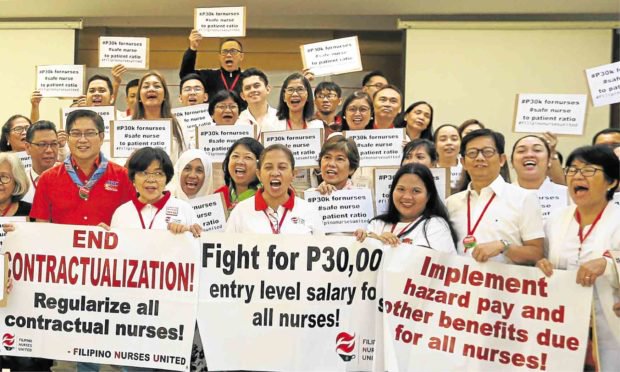Group seeks P30,000 basic pay for nurses

PAY HIKE DEMAND Members of the Filipino Nurses United call for a P30,000 entry-level salary for nurses on Tuesday, the start of the organization’s two-day congress in Manila. —EDWIN BACASMAS
MANILA, Philippines — For two years, “Bea” worked as a nurse at one of the country’s most efficient and reliable private hospitals in Metro Manila.
But unlike the top-notch care that patients would receive from the hospital, Bea was left to make do with a meager salary despite working long hours.
When she decided to resign last year, Bea’s basic monthly pay was only about P18,000. It was well below the monthly budget of at least P42,000 that, according to the National Economic and Development Authority, a family of five needed to live above the poverty line in 2018.
This is why the Filipino Nurses United (FNU), a national organization of nurses in government and private hospitals, is calling for a minimum salary of P30,000 for nurses to help ensure that enough of them stay in the hospitals.
“Right now, they wouldn’t bite even if there’s a call for them to stay. Because at the same time, you have [government-to-government programs] to Germany and Japan which offer nurses higher pay,” said FNU national president Eleanor Nolasco.
Data from the Department of Health (DOH) showed that in 2018, the government had under its employ only 13,152 nurses.
Gov’t hospital pay
The current take-home pay of nurses in public hospitals is between P18,000 and P21,000, said Nolasco, citing the findings of her group’s study.
It is even lower in private hospitals, especially in the provinces, at between P8,000 and P12,000.
This is despite the fact that Republic Act No. 9173, or the Philippine Nursing Act of 2002, provides that government nurses receive the minimum Salary Grade 15 (SG15), Nolasco lamented.
Depending on the class of a city or municipality, SG15 ranges from P19,845 to P30,531.
Nolasco admitted that the P30,000 starting salary FNU was seeking was not enough to keep a nurse in the country, especially when she can earn an average monthly salary equivalent to P160,000 in Canada and up to P200,000 in the United States.
‘Reasonable’ demand
“It’s really not enough. But we think that ours is a reasonable appeal. We are not asking beyond what is reasonable,” she said.
On paper, Bea’s shift was supposed to last eight hours, but in reality it could extend up to 12 hours.
While she was given overtime pay, it still was not enough to cover for all the stress she had to go through.
“The nurse-to-patient ratio was fine, but the demands from us nurses were just too much that it was no longer justifiable,” said Bea, who now works as an aesthetic nurse.
“It came to a point that the work was no longer satisfying. I lost my passion there,” she added.
Bea’s experience is not unique. FNU noted that some 200,000 nurses have opted to work in other health-related facilities offering services such as cosmetic procedures.
‘Unsafe’ ratio
Because nurses are discouraged to work in hospitals because of the low salaries, the nurse-to-patient ratio is now “unsafe,” especially in government hospitals, which could be as high as 1:40, according to Nolasco.
She pointed out that given that workload, a nurse could not deliver to patients the quality health care expected of her.
Ideally, the DOH standard is a nurse-to-patient ratio of 1:12.
Nolasco noted that the disparity was even larger in a community, where it was expected that a nurse would ideally have to take care of the needs of 20,000 people.
In Barangay Culiat in Quezon City, for instance, only one nurse is assigned to the community of 101,500 residents.
Polio, measles outbreak
Nolasco said that if only the government had enough nurses on the field, the current outbreaks of measles and polio could have been prevented, especially that this was being linked to low immunization.
“Health education and promotion are part of a nurse’s work. These [outbreaks are a] reflection of the poor public health system. The lack in human and material resources,” she said.
On Tuesday, FNU called on lawmakers to look into the renationalization of health services, especially because the current devolved system in which local governments run their health facilities has led to the “politicization of health.”
“As we see it now, there’s an imbalance. The state must take the bulk of the responsibility especially that health is a basic social service,” Nolasco said.
Disclaimer: The comments uploaded on this site do not necessarily represent or reflect the views of management and owner of Cebudailynews. We reserve the right to exclude comments that we deem to be inconsistent with our editorial standards.
